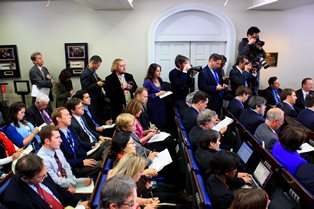 NEW YORK (CNNMoney) -- Jobs for journalists are on the upswing.
NEW YORK (CNNMoney) -- Jobs for journalists are on the upswing.
That's good news for an industry in upheaval. Just this month, there's been a flurry of deals involving struggling marquee American publications. Amazon founder and CEO Jeff Bezos bought The Washington Post, Red Sox owner John Henry purchased The Boston Globe, and Newsweek was bought by a digital news company IBT Media. Job cuts had been common at all three publications in recent years.
Now, a new survey from the University of Georgia shows that the tide may be turning for journalism graduates. About 66% of 2012 journalism graduates landed a full-time job roughly six to eight months after graduation, up from 62% in 2011. It was a also a big jump from 56% in 2009, during the depths of the recession, when the number of graduates that landed a job was at the lowest point in two decades .
"Employers might be shedding senior-level jobs, but there's always pressure to hire entry-level jobs," said Lee Becker, professor of journalism at the University of Georgia and co-author of the report. Becker said the number of jobs might also be rising because of the increase in start-up online publications.
Journalism graduates have faced a tough market in recent years. The effect of the recession was exacerbated by the dramatic shifts in the industry.
The rise in digital media and the different ways in how people consume news and entertainment, via their smartphones and tablets, has led to a decline in newspaper and magazine circulation. Thousands of newsroom jobs have been slashed at both large and small publications.
In keeping with these changes, journalists who work at online publications are now starting to command top salaries, whereas magazine and radio reporters' pay is below the industry average, the survey found.
Overall, salaries have also been rising. The median annual starting salary climbed to $32,000 in 2012, from $31,000 in 2011.
But it's not yet time to pop the champagne.
Journalists' salaries are a lot lower than the median annual salary of $42,666 for all 2012 graduates, according to the National Association of Colleges and Employers.
That's not too different from how it's been historically, because people are attracted to the glamor of a journalist's job, rather than the pay.
"Being a journalist is more of a calling than a job," said William McKeen, chairman of the journalism department at Boston University College of Communication.
Other firms are also noticing the uptick. Job postings for journalists are up about 30% since 2009, according to Joseph Jaccom, U.S. job manager at Gorkana, a media intelligence firm.
Still, it's not enough to take away the anxiety over jobs for journalism students. Rachel Gross, a graduate student at Medill School of Journalism, Northwestern University, will graduate this December. She has some solid credentials -- she interned at Wired magazine and freelanced for The New York Times Bay Area.
But Gross is mentally preparing herself for a career that might not be as steady.
"I'm freelancing now and would like to keep freelancing after I graduate," Gross said. "It will be great if I do get a full-time job."
Portland and Seattle
Free Subscription to Breaking News
Free Subscription to Breaking News























































































































































































































































































































































